Jennifer Barclay's Blog, page 8
December 10, 2015
My First Greek Island Christmas
 Welcome to a special post where I have the opportunity to introduce five other Greek biased bloggers via a Christmas ‘blog hop’. First up is a taster of the story I’ll be telling in my upcoming book, An Octopus in My Ouzo; at the end you’ll find links to the other blog posts which go live at the same time – so enjoy, comment and in the true Christmas spirit, share with family and friends! Here’s My First Greek Island Christmas…
Welcome to a special post where I have the opportunity to introduce five other Greek biased bloggers via a Christmas ‘blog hop’. First up is a taster of the story I’ll be telling in my upcoming book, An Octopus in My Ouzo; at the end you’ll find links to the other blog posts which go live at the same time – so enjoy, comment and in the true Christmas spirit, share with family and friends! Here’s My First Greek Island Christmas…
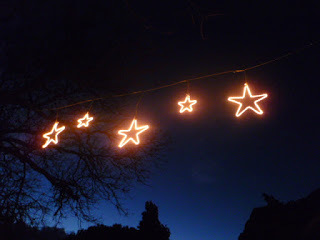 At dusk, a man was scaling a huge fish on the road through the village; a couple of ladies sat on a terrace sorting vegetables; a little boy was out walking alone. Low voices could be heard from the kafeneion, and conversations from houses carried into the curving, whitewashed alleys. December 2011 was my first living on the island of Tilos.
At dusk, a man was scaling a huge fish on the road through the village; a couple of ladies sat on a terrace sorting vegetables; a little boy was out walking alone. Low voices could be heard from the kafeneion, and conversations from houses carried into the curving, whitewashed alleys. December 2011 was my first living on the island of Tilos.There was none of the fuss that too often goes with Christmas, no spending frenzy, no sales – the two village shops in Megalo Horio were exactly the same as all year round, and mercifully without Christmas tunes. The only signs of the approach of Christmas were at the entrance to the village: a string of simple white stars strung over the road and the white outline of a boat with the words Khronia Polla – the exhortation ‘many years’, like ‘many happy returns’.
It had been the gentlest of Decembers; warm enough to swim in the sea and yet cool enough to be perfect for walking – no need to carry water, and I could cut across country and head for the hills, spotting yellow crocus and mauve colchicums. I felt very lucky to be here for the winter. For my last swim of the year in mid-December, I walked to the beach and little fish leaped out of the sea. By three in the afternoon, the shadow of the hillside was creeping over; as I returned home at four, the sun was just going behind the mountain. Pavlos arrived soon after on his little scooter, switched it off and lit up his cigarette.‘Iremia,’ he said, appreciating the peace and quiet. He put his hands in his jacket pockets and, like a magician, pulled out four fresh eggs.I would love a quiet Christmas here, I thought, but it would have to wait for another year. On Christmas Day in London, I met my ten-year-old cousin for the first time. She grew up on a farm, and I recognised that she was bored stuck in the house all day surrounded by adults. So I walked with her down to the river where we watched the geese and the swans, and she climbed on railings and ran down the muddy path, and I told her about the magical island where I now lived.
 By December 2012, I was feeling more and more at home on Tilos. One day old Hippocrates, who seemed gruff at first, stopped his ancient moped to offer me a lift to the village. It felt like a breakthrough though I declined, not sure the moped would survive.Thinking about our upcoming trip to England for Christmas, Stelios and I laughed as we had ‘fish and chips’ for dinner. Much as I love English fish and chips, I was very happy for my South Aegean version to be fresh fish caught that morning, potatoes newly dug from the garden, both fried in local olive oil with local lemon squeezed on top and oregano from the fields around the house. I made mulled wine with thyme honey and orange from the island, cinnamon and cloves. In Megalo Horio, the bougainvillaea was heavy with magenta flowers. This last month the island had been more beautiful than I’d ever seen it, the light so clear. On a sunny afternoon at Ayios Andonis, looking across to the island of Nisyros you could practically see what they were having for dinner up in the village on the rim of the caldera. From my house, looking down the Eristos valley, the island of Karpathos was often visible on the horizon like a rock rising from mist.On the last day before we left in mid-December, the bay at Eristos was bright silver in warm sunshine and, as I had my last swim of the year on an empty beach, I thought how hard it was to leave. The next day Remezzo, the café at the ferry dock, was a bustling mix of those leaving and those staying, kisses goodbye. The big ferry arrived and on deck I watched the blue and silver seascape.A summer of speaking English with customers at his kantina on the beach had given Stelios confidence and he charmed my friends and family, but he found the weather in England grey and the society too restrictive – he couldn’t smoke anywhere he wanted. He had brought a plastic water bottle of souma, the strong local spirit, to contribute to our family Christmas lunch in London. Everyone politely declined, preferring to drink champagne as they bantered merrily, but he continued to thrust the slightly grubby-looking bottle at them oblivious, enjoying himself.
By December 2012, I was feeling more and more at home on Tilos. One day old Hippocrates, who seemed gruff at first, stopped his ancient moped to offer me a lift to the village. It felt like a breakthrough though I declined, not sure the moped would survive.Thinking about our upcoming trip to England for Christmas, Stelios and I laughed as we had ‘fish and chips’ for dinner. Much as I love English fish and chips, I was very happy for my South Aegean version to be fresh fish caught that morning, potatoes newly dug from the garden, both fried in local olive oil with local lemon squeezed on top and oregano from the fields around the house. I made mulled wine with thyme honey and orange from the island, cinnamon and cloves. In Megalo Horio, the bougainvillaea was heavy with magenta flowers. This last month the island had been more beautiful than I’d ever seen it, the light so clear. On a sunny afternoon at Ayios Andonis, looking across to the island of Nisyros you could practically see what they were having for dinner up in the village on the rim of the caldera. From my house, looking down the Eristos valley, the island of Karpathos was often visible on the horizon like a rock rising from mist.On the last day before we left in mid-December, the bay at Eristos was bright silver in warm sunshine and, as I had my last swim of the year on an empty beach, I thought how hard it was to leave. The next day Remezzo, the café at the ferry dock, was a bustling mix of those leaving and those staying, kisses goodbye. The big ferry arrived and on deck I watched the blue and silver seascape.A summer of speaking English with customers at his kantina on the beach had given Stelios confidence and he charmed my friends and family, but he found the weather in England grey and the society too restrictive – he couldn’t smoke anywhere he wanted. He had brought a plastic water bottle of souma, the strong local spirit, to contribute to our family Christmas lunch in London. Everyone politely declined, preferring to drink champagne as they bantered merrily, but he continued to thrust the slightly grubby-looking bottle at them oblivious, enjoying himself.

 In December 2013, for difficult reasons, I finally found an excuse to remain on Tilos for my first Greek island Christmas. I would have Christmas Day on the island for the first time, walking our dog in the wind and sun, high on hilltops. I made a simple festive decoration for the fireplace from greenery gathered in the valley, and from the bakery Stelios bought melomacarona, honey cakes, and kourabiedes, shortbread dusted in sugar. I spent the cold evenings as I always wanted, reading books in front of the fire. Village kids came around to the house on Christmas Eve to sing carols off-key. Tha ta poumeh?A little international group of friends met that night at the taverna in the village, Kali Kardia – the ‘good heart’. I learned that Santa comes on New Year's Eve in Greece, not Christmas Eve. Well of course – he can't be everywhere at once, can he? New Year’s Eve saw us with the same group of friends, eating and drinking and talking at a house by the harbour. As the evening progressed, Stelios kept looking at the clock, as anything after ten seemed late when he was back to a routine of fishing at dawn. So there was no danger of missing midnight – though we might have otherwise, with no television, no mobile phone reception, no other people about. To welcome in the New Year, we took our glasses outside in the dark, stood on the end of the jetty at the end of the island and looked up at the thousands of bright stars.
In December 2013, for difficult reasons, I finally found an excuse to remain on Tilos for my first Greek island Christmas. I would have Christmas Day on the island for the first time, walking our dog in the wind and sun, high on hilltops. I made a simple festive decoration for the fireplace from greenery gathered in the valley, and from the bakery Stelios bought melomacarona, honey cakes, and kourabiedes, shortbread dusted in sugar. I spent the cold evenings as I always wanted, reading books in front of the fire. Village kids came around to the house on Christmas Eve to sing carols off-key. Tha ta poumeh?A little international group of friends met that night at the taverna in the village, Kali Kardia – the ‘good heart’. I learned that Santa comes on New Year's Eve in Greece, not Christmas Eve. Well of course – he can't be everywhere at once, can he? New Year’s Eve saw us with the same group of friends, eating and drinking and talking at a house by the harbour. As the evening progressed, Stelios kept looking at the clock, as anything after ten seemed late when he was back to a routine of fishing at dawn. So there was no danger of missing midnight – though we might have otherwise, with no television, no mobile phone reception, no other people about. To welcome in the New Year, we took our glasses outside in the dark, stood on the end of the jetty at the end of the island and looked up at the thousands of bright stars.
 If you'd like to visit more blogs celebrating Greek Christmas themes, then take a hop through the list below – I’m excited about reading them myself! If you could leave a comment on one or more of the blogs, we’ll all be delighted.
If you'd like to visit more blogs celebrating Greek Christmas themes, then take a hop through the list below – I’m excited about reading them myself! If you could leave a comment on one or more of the blogs, we’ll all be delighted.Sugared Almond Biscuits (Κουραμπιέδες) by Amanda Bidirni
Kritsa Christmas by Yvonne Payne
My first Greek Christmas by Julie Ryan
Beers with Santa on Tilos by Ian Smith
Christmas Stock In by Richard Stevens
Published on December 10, 2015 20:00
December 2, 2015
Neighbours
 It often strikes me how intimately we live among our few neighbours here in Megalo Horio – laughing to myself at the sounds (some not so pleasant) that distinguish one person from another as they pass down the narrow alley in front of my house. The young children play outside, Michaelia stops by for chat and Irini calls good morning through my office window. But I’m rarely bothered by my neighbours because the houses on either side are empty. One, like so many in the village, is abandoned, the other well-kept by someone who only visits for a couple of weeks a year. I enjoy the privacy of not being overlooked and not overlooking anyone else; not having to listen to anyone else’s noise or worry about my own. So I was surprised the other day when I went outside to find out why Lisa was barking, and found not a cat but Kostas the Cretan sitting on the upstairs wall. We were pleased to see one another; I missed his visit last year, but remember a convivial evening at his house with Menelaos the year before. Kostas comes here for a holiday so he spent his first afternoon outside in the sunshine, talking to friends on his phone, opening up the house. And when he comes here he likes to invite friends over and party. He and Menelaos and other men were engaged yesterday in a rowdy discussion over glasses of raki from late morning. When he offered me a glass, I declined, saying I had work to do, though by then I’d actually finished my work and was ready to go for a walk. A raki might have been just the thing, I realised too late, remembering that I walked the Samaria Gorge after having raki and chestnuts for breakfast. Still, I avoided the men later in the dark of the evening when they called out to me and I realised they were still on the booze. I retreated into my kitchen and kept a low profile.At least in the winter you can go inside. In the summer when it’s so hot I have to sleep outside on my terrace, I’ve cursed neighbours of various nationalities for their late-night parties when I have to work the next day, and have gone to bed thinking I must move away from the village again, back to somewhere remote surrounded by fields and animals. Lisa loves living in the village because of all the activity. The problem is that she has a habit of barking not only at potential intruders, but also at her favourite people. She likes attention and is worried they may go by without stroking her unless she makes a fuss. Then I have to shout at her to be quiet. The neighbours must curse me too.The wind is wild this morning outside my cosy kitchen where I’m drinking my Greek coffee. Outside, the sky is blue and bright; usually by lunchtime the sun is warm and I’m ready for a walk and a swim, but sometimes the wind whips up the sea into crashing waves. Yesterday evening it turned seriously cold after dark, and when I hurried to the shop for a few supplies, the usual trio of villagers who sit outside at the table were being invited to set up their chairs inside instead. Nikos L. sat down holding his stick in front of him and garbled something about summer, erupting in a scale of laughter. The only fresh vegetables were carrots and tomatoes, but down at Eristos yesterday I was excited to see one of the farmers had fresh potatoes and spinach in the back of his truck.The day could not have been more perfect for a walk, a quick swim and a birthday feast last weekend. I'd been too caught up with an important piece of work to organise anything beforehand for friends. Thanks to Yianni (aka John Ageos) for keeping me away from my computer, for coffee and a walk above the monastery, the fish barbecue and the birthday cake and the photos of me and Lisa.
It often strikes me how intimately we live among our few neighbours here in Megalo Horio – laughing to myself at the sounds (some not so pleasant) that distinguish one person from another as they pass down the narrow alley in front of my house. The young children play outside, Michaelia stops by for chat and Irini calls good morning through my office window. But I’m rarely bothered by my neighbours because the houses on either side are empty. One, like so many in the village, is abandoned, the other well-kept by someone who only visits for a couple of weeks a year. I enjoy the privacy of not being overlooked and not overlooking anyone else; not having to listen to anyone else’s noise or worry about my own. So I was surprised the other day when I went outside to find out why Lisa was barking, and found not a cat but Kostas the Cretan sitting on the upstairs wall. We were pleased to see one another; I missed his visit last year, but remember a convivial evening at his house with Menelaos the year before. Kostas comes here for a holiday so he spent his first afternoon outside in the sunshine, talking to friends on his phone, opening up the house. And when he comes here he likes to invite friends over and party. He and Menelaos and other men were engaged yesterday in a rowdy discussion over glasses of raki from late morning. When he offered me a glass, I declined, saying I had work to do, though by then I’d actually finished my work and was ready to go for a walk. A raki might have been just the thing, I realised too late, remembering that I walked the Samaria Gorge after having raki and chestnuts for breakfast. Still, I avoided the men later in the dark of the evening when they called out to me and I realised they were still on the booze. I retreated into my kitchen and kept a low profile.At least in the winter you can go inside. In the summer when it’s so hot I have to sleep outside on my terrace, I’ve cursed neighbours of various nationalities for their late-night parties when I have to work the next day, and have gone to bed thinking I must move away from the village again, back to somewhere remote surrounded by fields and animals. Lisa loves living in the village because of all the activity. The problem is that she has a habit of barking not only at potential intruders, but also at her favourite people. She likes attention and is worried they may go by without stroking her unless she makes a fuss. Then I have to shout at her to be quiet. The neighbours must curse me too.The wind is wild this morning outside my cosy kitchen where I’m drinking my Greek coffee. Outside, the sky is blue and bright; usually by lunchtime the sun is warm and I’m ready for a walk and a swim, but sometimes the wind whips up the sea into crashing waves. Yesterday evening it turned seriously cold after dark, and when I hurried to the shop for a few supplies, the usual trio of villagers who sit outside at the table were being invited to set up their chairs inside instead. Nikos L. sat down holding his stick in front of him and garbled something about summer, erupting in a scale of laughter. The only fresh vegetables were carrots and tomatoes, but down at Eristos yesterday I was excited to see one of the farmers had fresh potatoes and spinach in the back of his truck.The day could not have been more perfect for a walk, a quick swim and a birthday feast last weekend. I'd been too caught up with an important piece of work to organise anything beforehand for friends. Thanks to Yianni (aka John Ageos) for keeping me away from my computer, for coffee and a walk above the monastery, the fish barbecue and the birthday cake and the photos of me and Lisa.




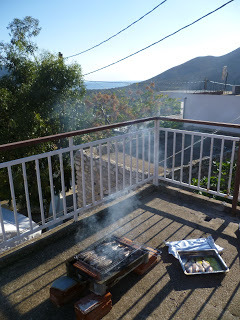

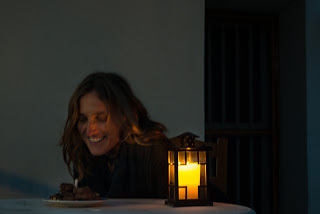
Published on December 02, 2015 22:31
November 18, 2015
A Flying Visit to Thessaloniki
Irini sees my office window open and says good morning. ‘Have you noticed how every morning I say “Kalimera Jennifer”?’ she adds, reminding me we’re neighbours and sighing contentedly at another beautiful day. ‘Does England have sun like this?’ Every now and then, however, my work as an editor and agent takes me away from this rather old-fashioned sort of life; for example, to Frankfurt book fair in mid-October.
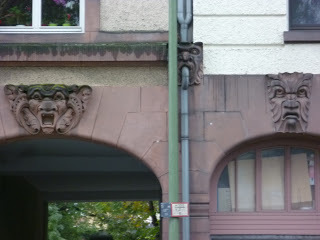 Uncertain how many days I’d need at the fair, and wanting to fit in a little time to enjoy the city – being your own boss has its advantages as well as costs – I waited until I was there to book a flight home. My best option, it seemed, was to stay three days and fly back to Greece via an overnight in Thessaloniki. It was so much cheaper that the saving would fund a hotel room – so why not make a flying visit? The Aegean flight left at the reasonable hour of 11 a.m. on the Friday, allowing me plenty of time to pack and make my way to the airport. I hadn’t planned on going out with the Australians on my last night in Frankfurt.
Uncertain how many days I’d need at the fair, and wanting to fit in a little time to enjoy the city – being your own boss has its advantages as well as costs – I waited until I was there to book a flight home. My best option, it seemed, was to stay three days and fly back to Greece via an overnight in Thessaloniki. It was so much cheaper that the saving would fund a hotel room – so why not make a flying visit? The Aegean flight left at the reasonable hour of 11 a.m. on the Friday, allowing me plenty of time to pack and make my way to the airport. I hadn’t planned on going out with the Australians on my last night in Frankfurt.
My base at the fair had been with my Australian publisher client, giving me an invitation to the Thursday night drinks party. We got talking to a funny, clever Dutch man in a good suit who worked for a newspaper book club. I can’t remember what we all talked about for so long, but we were joined by an interesting woman who had started a book-related website, by which time the red wine had run out and our Dutch friend had moved on to white, and soon announcements were telling us the fair was closed for the day. A dozen of us went off to dinner then and in the noisy tapas restaurant the wine and conversation continued merrily. After the chaps who ran the company responsible for shipping to the fair generously insisted on paying the bill, it would have been rude to put my foot down when they cajoled us into a nightcap afterwards at the Frankfurter Hof bar.
The taste-makers of the literary world do their earnest business at this grand hotel during the fair, but late at night in the bar you can hobnob alongside if you have the stamina. It is a dangerous place where the booze can make you feel glamorous and successful enough to flash your plastic card around in a way you regret when sifting through your receipts at a later date. Magically, several glasses of champagne materialised unbidden in my hand, thanks to other people’s plastic. We were a long way from Megalo Horio. What would Irini have thought, if she’d known?
I’m not sure exactly when I got myself a cab to my rented apartment in Offenbach. The next thing I knew, I was waking up in my comfortable bed, nonchalantly stretching, and picking up my phone to see that it was past eight. As my mind pieced things together, I saw I’d set the alarm for four in the morning, which must have made sense at the time but was no use to me now. I had a fast shower, packed my bag and dashed for the train for the airport.
Naturally, I was not at my best when I arrived a few hours later in Thessaloniki. Still, it would have been fine, except that when I’d booked my flight and told my friend Yianni of my plan to spend 24 hours in his home town, he had asked his father to meet me at the airport and show me around. There he was, a cheerful man waiting at arrivals with a handwritten sign saying ‘Jen’. I gave him my best smile and he kissed me on both cheeks. My computer had inexplicably stopped connecting to the internet a day ago, so I didn’t even have the address of my hotel. Yiannis’ father must have wondered if his son had gone a bit off the rails.

‘I like kosmo, Jennifer,’ said Yianni’s dad when I talked to him about liking the peace and solitude of Tilos – as if I hadn’t been in a very different environment only hours before. Kosmos – crowds, people. In Victoria Hislop’s excellent novel The Thread, she describes Thessaloniki of 1917 as the most vibrant and cosmopolitan city in Greece. It had become part of the Greek state just five years earlier. She tells how Christians, Jews and Muslims lived side by side until a series of devastating catastrophes changed everything.
Thessaloniki was crowded as we drove downtown, passing neoclassical villas dotted among the modern blocks. I remembered Yianni telling me how the streets in the centre had been dug up for a new metro line but work had halted because of the economic crisis. I’d been amused to see, when looking for a hotel online, that many of them showed their view of a busy road as a selling feature. Thankfully the place I’d booked was set back, a lovely old building, though my room smelled of cigarette smoke. ‘Are you sure it’s not a smell of bleach, since the maid has just cleaned the room?’ asked the man on reception. I had a shower, left the window open, and went for a walk.
Crossing Egnatia Street, I found a little shop advertising pizza and pasta takeaway for one euro fifty. I grabbed a slice and it was surprisingly good, made with fresh ingredients. I ate it as I wandered the streets towards the port, passing through curving old streets that looked as if they got lively at night. The waters of the Thermaic Gulf were still and grey, reflecting the cloudy sky. I started to follow the waterfront avenue to the White Tower, dating from the Ottomans, then veered off towards the Arch of Galerius.
The city was established in 316 BC by Kassandros and named after his wife, half-sister of Alexander the Great. The apostle Paul brought Christianity here in 50 AD, and a Roman officer called Demetrius was martyred here in 303 and became the city’s patron saint. The old buildings scattered around the city are Roman, Byzantine – it was the second biggest city in the Byzantine Empire – and Ottoman. Yiannis’ dad had pointed out the Byzantine churches that had been allowed to stand in Ottoman times as long as they were lower than the mosques, and a hammam that had still been in use until recently.
Thessaloniki was excellent for bargain shopping that afternoon; I found a pair of jeans for twenty euros and then satisfied myself with an eighty-cent iced coffee to keep myself awake. I found a computer repair shop and took mine in to see if they could do anything. The man ran out of time to fix it but didn’t charge me anything. Yiannis’ dad was struggling with the traffic when he came to meet me, as protesters were marching down Egnatia Street.
He drove us to the upper part of the city, following the Byzantine walls to the edge of the castle and what was one of the most fearsome prisons in Greece. The lights of the city were spread out around the harbour below. We went to a traditional taverna which was still almost empty when we arrived around nine thirty, but gradually the musicians started playing rembetika, and the tables filled up. I ate a succulent dish of beef and aubergine and tomato, baked in the oven with cheese melted on top, and we shared horta and baked potatoes and white wine. I thanked him for bringing me there and we discussed how rare it was when you first arrived in a city to find the best places to eat. He talked about his few days in Rome. ‘Then fagame tipota. The food was nothing.’
As he drove me back downtown, he pointed out an elegant mansion. ‘That’s where Kemal Ataturk lived.’ I asked him to drop me somewhere near Aristotelous Square – he’d said this was a central meeting point – so I could walk for a while. The city that had been grey by day was full of colour by night. Grand art deco buildings were illuminated and gorgeous, and without it feeling crowded there was a gentle buzz of nightlife. Alleyways around Athonos Square were now filled with tables and people eating and drinking, musicians playing. Many of the crowds were young people, students. I suddenly remembered that Yiannis had told me Thessaloniki for him was all about going out at night. I now understood.
Streets were dug up, buildings were falling down, the city was dirty, noisy, the hotels on the kentriko dromo grey with smog, there was too much traffic and parking was ‘gangster’ fashion as Yiannis’ dad had called it. More importantly, as the political demonstration that evening had reminded us, people were gradually losing everything they’d worked for through taxes and cuts and unemployment. Yet people still managed to have fun.

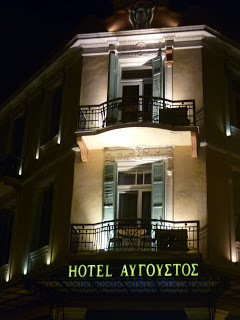

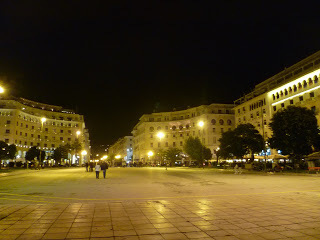 It was just before eight in the morning when I set out again down the same streets, feeling considerably more alive than the day before. I thought I heard the bass boom of music – but maybe it was something else. I turned a corner and saw three young men in t-shirts and jeans exiting a doorway onto the street. One of them shouted, ‘Techno!’ I looked up and saw lights flashing behind some dilapidated shutters, and a discreet sign for a club, Tokyo. Nearby, others were leaving another café-bar. ‘Kali xekourasi… keh kalimera,’ someone called out: have a good rest and a good day.
It was just before eight in the morning when I set out again down the same streets, feeling considerably more alive than the day before. I thought I heard the bass boom of music – but maybe it was something else. I turned a corner and saw three young men in t-shirts and jeans exiting a doorway onto the street. One of them shouted, ‘Techno!’ I looked up and saw lights flashing behind some dilapidated shutters, and a discreet sign for a club, Tokyo. Nearby, others were leaving another café-bar. ‘Kali xekourasi… keh kalimera,’ someone called out: have a good rest and a good day.
I thought as I had the night before how peacefully Greek people party, with none of the violence of English nightlife. I was taking photos, trying to be discreet and capture the scene where early risers sat outside on the streets drinking their coffee while late partyers stood around chatting quietly, when a couple on a motorbike drove right up to me and the young man said, ‘Shall I smile?’ I thought he was being aggressive but he and his girlfriend waved as they left and I wished I’d said yes and taken their photo. Instead, I took pictures of the artsy graffiti. A poster in the window of a linens shop seemed to be advertising the late, great singer Stelios Kazantzidis for 14, 985 euros. Thessaloniki is famous for its bougatza, a pastry that’s usually filled with a sweet cream – which seems about as healthy as a particularly decadent doughnut – but at To Neon on Leontos Sophou Street I discovered bougatza can also be filled with meat or with spinach and cheese. I chose the latter and the baker sliced it into bite-sized morsels. It was hot from the oven and the spinach as fresh as if it had been picked the day before.
Thessaloniki is famous for its bougatza, a pastry that’s usually filled with a sweet cream – which seems about as healthy as a particularly decadent doughnut – but at To Neon on Leontos Sophou Street I discovered bougatza can also be filled with meat or with spinach and cheese. I chose the latter and the baker sliced it into bite-sized morsels. It was hot from the oven and the spinach as fresh as if it had been picked the day before.
It was good wandering the streets on a Saturday morning before they got busy. I came across the Bezestan, a fifteenth-century covered market where luxury goods such as jewels and fabrics were not only sold but also stored, functioning like a bank; the building had been restored after the 1978 earthquake. Not far away was today’s covered market, where tripe hung on hooks and a man was butchering a pig that hung from a hook. There were aisles of fresh fish and crabs, and outside a little old man sold bags of horta. On a nearby street, I spotted something unusual: vending machines and a picture of a cow; closer inspection revealed that you could re-fill your own bottles with locally produced milk. What a brilliant idea. There were bookshops and honey shops… I liked this place.
I had to leave soon, so I chose just one church to visit: Aheiropietos. It was built in the fifth century AD on the ruins of Roman baths, and decorative mosaics dated from then. Until the fourteenth century, it was the Great Church of the Holy Virgin. Inside, it was splendid: an airy hall with two rows of marble columns on two floors. In 1430 when the city fell to the Ottomans, it was the first church to be converted to a mosque. After liberation in 1912, restoration began but from 1922 to 1923 it hosted refugees from Asia Minor. This was during the population exchange after the Greco-Turkish War, when Muslims were repatriated in Turkey and Christians in Greece, displacing two million people. Aheiropietos became a Christian church again in 1930. The name means ‘not made by hands’.
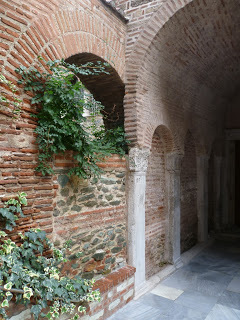


Dashing back to the hotel, I stopped at a juice shop and got a detoxing concoction for two euros. My flying visit of 24 hours in Thessaloniki had been a pleasure. I’d come back for the shopping and the nightlife and food, and next time I’d visit some of the art galleries and museums and see more historic monuments. And maybe I wouldn’t come straight from Frankfurt. Maybe I’d convince the boss to send me to Thessaloniki Book Fair instead.
 Uncertain how many days I’d need at the fair, and wanting to fit in a little time to enjoy the city – being your own boss has its advantages as well as costs – I waited until I was there to book a flight home. My best option, it seemed, was to stay three days and fly back to Greece via an overnight in Thessaloniki. It was so much cheaper that the saving would fund a hotel room – so why not make a flying visit? The Aegean flight left at the reasonable hour of 11 a.m. on the Friday, allowing me plenty of time to pack and make my way to the airport. I hadn’t planned on going out with the Australians on my last night in Frankfurt.
Uncertain how many days I’d need at the fair, and wanting to fit in a little time to enjoy the city – being your own boss has its advantages as well as costs – I waited until I was there to book a flight home. My best option, it seemed, was to stay three days and fly back to Greece via an overnight in Thessaloniki. It was so much cheaper that the saving would fund a hotel room – so why not make a flying visit? The Aegean flight left at the reasonable hour of 11 a.m. on the Friday, allowing me plenty of time to pack and make my way to the airport. I hadn’t planned on going out with the Australians on my last night in Frankfurt. My base at the fair had been with my Australian publisher client, giving me an invitation to the Thursday night drinks party. We got talking to a funny, clever Dutch man in a good suit who worked for a newspaper book club. I can’t remember what we all talked about for so long, but we were joined by an interesting woman who had started a book-related website, by which time the red wine had run out and our Dutch friend had moved on to white, and soon announcements were telling us the fair was closed for the day. A dozen of us went off to dinner then and in the noisy tapas restaurant the wine and conversation continued merrily. After the chaps who ran the company responsible for shipping to the fair generously insisted on paying the bill, it would have been rude to put my foot down when they cajoled us into a nightcap afterwards at the Frankfurter Hof bar.
The taste-makers of the literary world do their earnest business at this grand hotel during the fair, but late at night in the bar you can hobnob alongside if you have the stamina. It is a dangerous place where the booze can make you feel glamorous and successful enough to flash your plastic card around in a way you regret when sifting through your receipts at a later date. Magically, several glasses of champagne materialised unbidden in my hand, thanks to other people’s plastic. We were a long way from Megalo Horio. What would Irini have thought, if she’d known?
I’m not sure exactly when I got myself a cab to my rented apartment in Offenbach. The next thing I knew, I was waking up in my comfortable bed, nonchalantly stretching, and picking up my phone to see that it was past eight. As my mind pieced things together, I saw I’d set the alarm for four in the morning, which must have made sense at the time but was no use to me now. I had a fast shower, packed my bag and dashed for the train for the airport.
Naturally, I was not at my best when I arrived a few hours later in Thessaloniki. Still, it would have been fine, except that when I’d booked my flight and told my friend Yianni of my plan to spend 24 hours in his home town, he had asked his father to meet me at the airport and show me around. There he was, a cheerful man waiting at arrivals with a handwritten sign saying ‘Jen’. I gave him my best smile and he kissed me on both cheeks. My computer had inexplicably stopped connecting to the internet a day ago, so I didn’t even have the address of my hotel. Yiannis’ father must have wondered if his son had gone a bit off the rails.

‘I like kosmo, Jennifer,’ said Yianni’s dad when I talked to him about liking the peace and solitude of Tilos – as if I hadn’t been in a very different environment only hours before. Kosmos – crowds, people. In Victoria Hislop’s excellent novel The Thread, she describes Thessaloniki of 1917 as the most vibrant and cosmopolitan city in Greece. It had become part of the Greek state just five years earlier. She tells how Christians, Jews and Muslims lived side by side until a series of devastating catastrophes changed everything.
Thessaloniki was crowded as we drove downtown, passing neoclassical villas dotted among the modern blocks. I remembered Yianni telling me how the streets in the centre had been dug up for a new metro line but work had halted because of the economic crisis. I’d been amused to see, when looking for a hotel online, that many of them showed their view of a busy road as a selling feature. Thankfully the place I’d booked was set back, a lovely old building, though my room smelled of cigarette smoke. ‘Are you sure it’s not a smell of bleach, since the maid has just cleaned the room?’ asked the man on reception. I had a shower, left the window open, and went for a walk.
Crossing Egnatia Street, I found a little shop advertising pizza and pasta takeaway for one euro fifty. I grabbed a slice and it was surprisingly good, made with fresh ingredients. I ate it as I wandered the streets towards the port, passing through curving old streets that looked as if they got lively at night. The waters of the Thermaic Gulf were still and grey, reflecting the cloudy sky. I started to follow the waterfront avenue to the White Tower, dating from the Ottomans, then veered off towards the Arch of Galerius.
The city was established in 316 BC by Kassandros and named after his wife, half-sister of Alexander the Great. The apostle Paul brought Christianity here in 50 AD, and a Roman officer called Demetrius was martyred here in 303 and became the city’s patron saint. The old buildings scattered around the city are Roman, Byzantine – it was the second biggest city in the Byzantine Empire – and Ottoman. Yiannis’ dad had pointed out the Byzantine churches that had been allowed to stand in Ottoman times as long as they were lower than the mosques, and a hammam that had still been in use until recently.

Thessaloniki was excellent for bargain shopping that afternoon; I found a pair of jeans for twenty euros and then satisfied myself with an eighty-cent iced coffee to keep myself awake. I found a computer repair shop and took mine in to see if they could do anything. The man ran out of time to fix it but didn’t charge me anything. Yiannis’ dad was struggling with the traffic when he came to meet me, as protesters were marching down Egnatia Street.
He drove us to the upper part of the city, following the Byzantine walls to the edge of the castle and what was one of the most fearsome prisons in Greece. The lights of the city were spread out around the harbour below. We went to a traditional taverna which was still almost empty when we arrived around nine thirty, but gradually the musicians started playing rembetika, and the tables filled up. I ate a succulent dish of beef and aubergine and tomato, baked in the oven with cheese melted on top, and we shared horta and baked potatoes and white wine. I thanked him for bringing me there and we discussed how rare it was when you first arrived in a city to find the best places to eat. He talked about his few days in Rome. ‘Then fagame tipota. The food was nothing.’
As he drove me back downtown, he pointed out an elegant mansion. ‘That’s where Kemal Ataturk lived.’ I asked him to drop me somewhere near Aristotelous Square – he’d said this was a central meeting point – so I could walk for a while. The city that had been grey by day was full of colour by night. Grand art deco buildings were illuminated and gorgeous, and without it feeling crowded there was a gentle buzz of nightlife. Alleyways around Athonos Square were now filled with tables and people eating and drinking, musicians playing. Many of the crowds were young people, students. I suddenly remembered that Yiannis had told me Thessaloniki for him was all about going out at night. I now understood.
Streets were dug up, buildings were falling down, the city was dirty, noisy, the hotels on the kentriko dromo grey with smog, there was too much traffic and parking was ‘gangster’ fashion as Yiannis’ dad had called it. More importantly, as the political demonstration that evening had reminded us, people were gradually losing everything they’d worked for through taxes and cuts and unemployment. Yet people still managed to have fun.



 It was just before eight in the morning when I set out again down the same streets, feeling considerably more alive than the day before. I thought I heard the bass boom of music – but maybe it was something else. I turned a corner and saw three young men in t-shirts and jeans exiting a doorway onto the street. One of them shouted, ‘Techno!’ I looked up and saw lights flashing behind some dilapidated shutters, and a discreet sign for a club, Tokyo. Nearby, others were leaving another café-bar. ‘Kali xekourasi… keh kalimera,’ someone called out: have a good rest and a good day.
It was just before eight in the morning when I set out again down the same streets, feeling considerably more alive than the day before. I thought I heard the bass boom of music – but maybe it was something else. I turned a corner and saw three young men in t-shirts and jeans exiting a doorway onto the street. One of them shouted, ‘Techno!’ I looked up and saw lights flashing behind some dilapidated shutters, and a discreet sign for a club, Tokyo. Nearby, others were leaving another café-bar. ‘Kali xekourasi… keh kalimera,’ someone called out: have a good rest and a good day. I thought as I had the night before how peacefully Greek people party, with none of the violence of English nightlife. I was taking photos, trying to be discreet and capture the scene where early risers sat outside on the streets drinking their coffee while late partyers stood around chatting quietly, when a couple on a motorbike drove right up to me and the young man said, ‘Shall I smile?’ I thought he was being aggressive but he and his girlfriend waved as they left and I wished I’d said yes and taken their photo. Instead, I took pictures of the artsy graffiti. A poster in the window of a linens shop seemed to be advertising the late, great singer Stelios Kazantzidis for 14, 985 euros.
 Thessaloniki is famous for its bougatza, a pastry that’s usually filled with a sweet cream – which seems about as healthy as a particularly decadent doughnut – but at To Neon on Leontos Sophou Street I discovered bougatza can also be filled with meat or with spinach and cheese. I chose the latter and the baker sliced it into bite-sized morsels. It was hot from the oven and the spinach as fresh as if it had been picked the day before.
Thessaloniki is famous for its bougatza, a pastry that’s usually filled with a sweet cream – which seems about as healthy as a particularly decadent doughnut – but at To Neon on Leontos Sophou Street I discovered bougatza can also be filled with meat or with spinach and cheese. I chose the latter and the baker sliced it into bite-sized morsels. It was hot from the oven and the spinach as fresh as if it had been picked the day before. It was good wandering the streets on a Saturday morning before they got busy. I came across the Bezestan, a fifteenth-century covered market where luxury goods such as jewels and fabrics were not only sold but also stored, functioning like a bank; the building had been restored after the 1978 earthquake. Not far away was today’s covered market, where tripe hung on hooks and a man was butchering a pig that hung from a hook. There were aisles of fresh fish and crabs, and outside a little old man sold bags of horta. On a nearby street, I spotted something unusual: vending machines and a picture of a cow; closer inspection revealed that you could re-fill your own bottles with locally produced milk. What a brilliant idea. There were bookshops and honey shops… I liked this place.
I had to leave soon, so I chose just one church to visit: Aheiropietos. It was built in the fifth century AD on the ruins of Roman baths, and decorative mosaics dated from then. Until the fourteenth century, it was the Great Church of the Holy Virgin. Inside, it was splendid: an airy hall with two rows of marble columns on two floors. In 1430 when the city fell to the Ottomans, it was the first church to be converted to a mosque. After liberation in 1912, restoration began but from 1922 to 1923 it hosted refugees from Asia Minor. This was during the population exchange after the Greco-Turkish War, when Muslims were repatriated in Turkey and Christians in Greece, displacing two million people. Aheiropietos became a Christian church again in 1930. The name means ‘not made by hands’.



Dashing back to the hotel, I stopped at a juice shop and got a detoxing concoction for two euros. My flying visit of 24 hours in Thessaloniki had been a pleasure. I’d come back for the shopping and the nightlife and food, and next time I’d visit some of the art galleries and museums and see more historic monuments. And maybe I wouldn’t come straight from Frankfurt. Maybe I’d convince the boss to send me to Thessaloniki Book Fair instead.
Published on November 18, 2015 07:24
October 4, 2015
First days of October
 An Octopus in my Ouzo, my new book, was sent to the publisher for the deadline of 1st October. Soon I'll get input from an editor, and last week I got a glimpse of the gorgeous cover design. If all goes well, the book will be out next April.
An Octopus in my Ouzo, my new book, was sent to the publisher for the deadline of 1st October. Soon I'll get input from an editor, and last week I got a glimpse of the gorgeous cover design. If all goes well, the book will be out next April. In the meantime, after a rainstorm in late September that turned alleyways into rivers for a day - and resulted in some dramatic moments in Livadia harbour when a boat was submerged and had to be rescued - the weather has turned perfect. Nights are cool, good for sleeping; by day we have hot sunshine and warm sea, but it's cool enough for walking. And the first green leaves of winter are appearing.

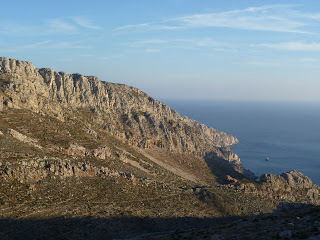


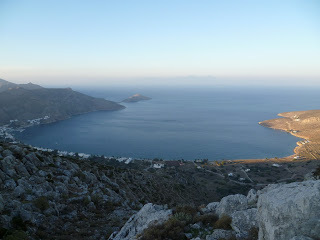

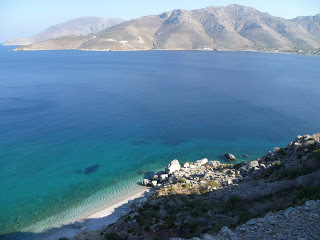

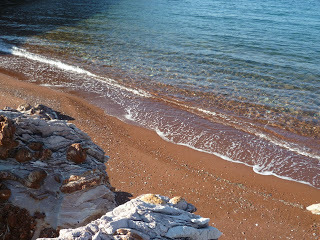
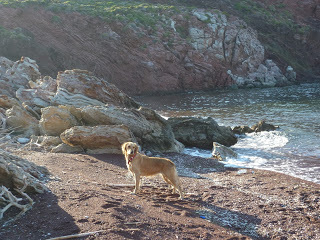
Published on October 04, 2015 01:38
September 18, 2015
The Good Greek Girl, Maria Katsonis
 I'm restraining myself from writing tales from Tilos here so I can finish my new book; I thought I'd post this in the meantime about a book I read in Australia.
I'm restraining myself from writing tales from Tilos here so I can finish my new book; I thought I'd post this in the meantime about a book I read in Australia.Maria Katsonis grew up in the 1970s in the Greek community in Melbourne, Australia. Above her parents' milk bar, she shared a bedroom with her yiayia, her grandmother. Her father used to make tzatziki by straining the yoghurt in an adapted singlet hanging in the shower. A good Greek girl, she went to university to study economics.
It was then that she discovered she was attracted to women, not men. She abandoned the economics degree for a career in theatre. Summoning the courage to come out about being a lesbian to her family, she met with violence from her father and ostracism from her family and the community. She was sent away from home and had no choice but to embrace a new independence. Gradually, she left the theatre for arts management and then public service in the government. As a mature student, she graduated from Harvard with a Masters.
Then, her mother had a stroke. The good Greek girl cared for her mother until she died, then stayed at home to look after her father until his death too. It led to a complete mental breadown and a serious episode of depression during which she was hospitalised. When she was finally well enough to go back to work, she realised she was uncomfortable hiding the truth, colluding with the secrecy of mental illness. Talking to colleagues about depression, she was astonished by the outpouring of stories and she started to write a book.
But a second story started to creep into the book - that of what it meant to be a Greek daughter. Through the writing she began to see traits she had inherited from her parents: filotimo, the love of honour, from her father, and her mother's filoxenia and kefi.
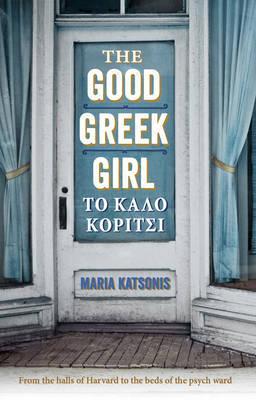 She had connected with Greece on her third visit to the country at the age of thirty. 'I felt at home in modern Greece, a contemporary country that had moved with the times, unlike the cloistered Greek village of Melbourne.' Visiting her father's village, Lidoriki, in a mountainous region just north of the Gulf of Corinth near Delphi, she was impressed by her 70-year-old great aunt who rose at dawn to bake the bread daily and had no qualms about slaughtering a goat or chicken from the yard for a feast.
She had connected with Greece on her third visit to the country at the age of thirty. 'I felt at home in modern Greece, a contemporary country that had moved with the times, unlike the cloistered Greek village of Melbourne.' Visiting her father's village, Lidoriki, in a mountainous region just north of the Gulf of Corinth near Delphi, she was impressed by her 70-year-old great aunt who rose at dawn to bake the bread daily and had no qualms about slaughtering a goat or chicken from the yard for a feast.On her fourth trip, as she was coming to the end of writing her story, the tzatziki at the taverna reminded her of how her father used to make it, and she found out she knew relatives of the taverna owner back in 'Afstralia'. 'I was now part of the village's history like my father.'
Maria is a senior executive in the Victorian government and an advocate with the Australia Council for Mental Health. She is a good Greek girl, 'just an unconventional one'. Her book, The Good Greek Girl, was published by Ventura Press earlier this year.
Published on September 18, 2015 04:38
August 20, 2015
It's almost scary when you get what you wish for
It’s almost scary when you get the things you wish for. Maybe I should have been thinking bigger. World peace? Johnny Depp? But I had no time for Johnny right then...
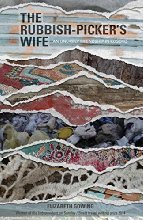
Elizabeth Gowing has a knack for making what might seem a fairly esoteric story into a gripping read. Her first book was about an interest in honey-making in Kosovo. For her next, Edith and I, she followed in the footsteps of an Edwardian lady traveller in the region. And when I first started reading this new story, The Rubbish-Picker's Wife, about an unlikely friendship with a rubbish-picker’s wife in a minority Muslim Roma community in Kosovo, I did wonder for a moment whether it was a step too far into obscurity. Yet before long, thanks in part to her lovely writing style, I was hooked.
Gowing, a trained teacher, had been living in Kosovo for four years and was working with NGOs and international charities when she first visited Fushë Kosovë, where people lived in shacks surrounded by mud. She was there to offer a few bags of equipment which might be useful for families in need – most of them earned their money by scavenging through rubbish for recyclables. When a woman asked for money to buy medicine for her son, Elizabeth walked away. But she didn’t get very far. Soon she learned that none of the children in the community were attending school, mostly through a systemic prejudice among the majority Albanian population against people of Ashkali background. Slowly, she began to find a way to help these children to an education.
I was reminded along the way of the challenges I faced when trying to set up English sessions for the kids on our little Greek island – how exhausting it was setting it up with a lack of resources, but knowing that unless I did, they couldn’t progress. Funnily enough, then it was an Albanian family, a minority on a Greek island, whose child would have struggled to get to classes if I hadn’t been able to take him with me. I was also reminded of the sense of responsibility, and all the mistakes I made trying to do this in my first year of trying to integrate into island life, when Gowing wrote:
I had the same sense I had with speaking Albanian, that as I blundered through these foreign structures, although I could generally make myself understood I must be causing sensitive listeners to flinch repeatedly as I got things wrong, broke rules, and transgressed in ways I wasn’t even aware of.
As I followed her ups and downs in trying to get a schooling project off the ground, then building it into a sustainable organisation, the children’s enthusiasm for learning was a joy to read. It was no easy task to keep these kids in school when their families were used to sending them out to work to help put food in their mouths. But when the officials stopped finding excuses and started helping, it was clear that something significant had been achieved.
It was interesting to me to read that baklava is a Kosovo treat too, and what they call burek is so similar to spanakopita. That part of the Balkans was part of the Ottoman Empire just like Greece. There were more connections to my Greek life in this book than I’d foreseen, and I was pleased I’d had an opportunity to read this about this unlikely friendship.
The Rubbish-Picker's Wife was published this summer and is available on Kindle and Amazon and from bookshops.http://www.rubbishpickerswife.com/

Elizabeth Gowing has a knack for making what might seem a fairly esoteric story into a gripping read. Her first book was about an interest in honey-making in Kosovo. For her next, Edith and I, she followed in the footsteps of an Edwardian lady traveller in the region. And when I first started reading this new story, The Rubbish-Picker's Wife, about an unlikely friendship with a rubbish-picker’s wife in a minority Muslim Roma community in Kosovo, I did wonder for a moment whether it was a step too far into obscurity. Yet before long, thanks in part to her lovely writing style, I was hooked.
Gowing, a trained teacher, had been living in Kosovo for four years and was working with NGOs and international charities when she first visited Fushë Kosovë, where people lived in shacks surrounded by mud. She was there to offer a few bags of equipment which might be useful for families in need – most of them earned their money by scavenging through rubbish for recyclables. When a woman asked for money to buy medicine for her son, Elizabeth walked away. But she didn’t get very far. Soon she learned that none of the children in the community were attending school, mostly through a systemic prejudice among the majority Albanian population against people of Ashkali background. Slowly, she began to find a way to help these children to an education.
I was reminded along the way of the challenges I faced when trying to set up English sessions for the kids on our little Greek island – how exhausting it was setting it up with a lack of resources, but knowing that unless I did, they couldn’t progress. Funnily enough, then it was an Albanian family, a minority on a Greek island, whose child would have struggled to get to classes if I hadn’t been able to take him with me. I was also reminded of the sense of responsibility, and all the mistakes I made trying to do this in my first year of trying to integrate into island life, when Gowing wrote:
I had the same sense I had with speaking Albanian, that as I blundered through these foreign structures, although I could generally make myself understood I must be causing sensitive listeners to flinch repeatedly as I got things wrong, broke rules, and transgressed in ways I wasn’t even aware of.
As I followed her ups and downs in trying to get a schooling project off the ground, then building it into a sustainable organisation, the children’s enthusiasm for learning was a joy to read. It was no easy task to keep these kids in school when their families were used to sending them out to work to help put food in their mouths. But when the officials stopped finding excuses and started helping, it was clear that something significant had been achieved.
It was interesting to me to read that baklava is a Kosovo treat too, and what they call burek is so similar to spanakopita. That part of the Balkans was part of the Ottoman Empire just like Greece. There were more connections to my Greek life in this book than I’d foreseen, and I was pleased I’d had an opportunity to read this about this unlikely friendship.
The Rubbish-Picker's Wife was published this summer and is available on Kindle and Amazon and from bookshops.http://www.rubbishpickerswife.com/
Published on August 20, 2015 22:57
August 2, 2015
Hot Competition
This is a little unusual, but I am running a competition. Share this blog post with your Twitter or Facebook friends using the hashtag #fallinginhoney this week, and you'll be entered into a prize draw to win a gorgeous ART PRINT of our island of Tilos, created by my friend Yiannis, a.k.a. John Ageos Daferanos. He lives in Livadia, which is obviously the wrong part of the island, but we try not to hold that against him. (Only kidding - some of my best friends live in Livadia...)

Why a competition? Well. Firstly, to celebrate the fact that FALLING IN HONEY is only 99p on Kindle this summer on Amazon UK sending it soaring up the Kindle charts, and there may still be people out there who haven't read it and would like to. (OK, there may be life on Mars, but still…)
Secondly – this is the exciting part – Summersdale will be publishing my NEW book set on the island in April 2016, and I have to decide on a title. Ideas include:AN OCTOPUS IN MY OUZOLUNCH AT THE BEACHJOINING THE DANCEA TASTE OF WILD BEAUTYOr a translation of an appropriate expression like 'falling in honey' that I haven't yet found... Any of them would be followed by an explanatory subtitle. Feedback and input gratefully received either through comments or the contact form.
Now, back to life in Megalo Horio…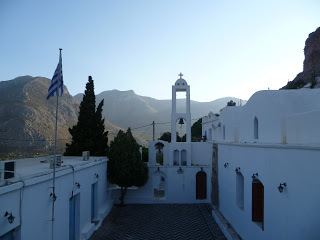
It’s that time of year when it’s so hot, I sleep outside, up on the terrace (on a comfy mattress with pillows of course - I may be weird but I'm not stupid). To block the streetlights down the alley, I’ve created a tent-like construction out of sheets and throws and mosquito net, which is strange but it means I sleep in the cool fresh air under the stars and moon.
I wake up as it gets light, am greeted by a friendly dog, and try to take her for a quick walk before the hot sun comes over the hillside. Then Lisa lies flat out in the shade, paws outstretched, and I work all day (never was the expression 'the sweat of my brow' for a day's work more pertinent) until it cools off enough to walk half an hour to the beach, picking the occasional warm ripe fig along the way. We dive in the sea and come back to work for several hours in the evening again, before collapsing into sleep.
Yesterday afternoon, with no pressing demands, I stayed on Eristos beach for hours, dozing and swimming and reading and throwing the ball for Lisa, until the sun went down behind the mountain. The line of tamarisk trees behind the beach was full of tents, and the edge of the water scattered with naked bodies, with a big stretch of hot sand in between, and the sea calm and clear and pale blue.
In the evening, after I got home – getting a good workout carrying home a three-kilo watermelon, two kilos of tomatoes and a couple of cucumbers – I had a craving for tzatziki. So I showered and dressed and walked down to Kali Kardia, passing Menelaos with his goatherd’s crooked stick coming up the steps (Yeia sou Jenni), and Fotis sitting outside the shop (Yeia sou Jenni), and ran into Astrologos, who is from Athens and one of Eristos’ most famous summer residents. He told me the planets were well aligned right now for Sagittarians, and said it was good to see me back from Australia.
‘Tilos is ena megalo kóllima,’ he said. It’s hard to translate. It’s a stickiness, something gluey - Tilos truly sticks to you, in other words. (New book title: Stuck in the honey… Or a sticky mess, as my friend Anna once put it. My friend Sam suggested something a bit naughtier about someone licking the honey off…)
‘Every summer,’ continued Astrologos, ‘I say I will visit some other islands, Karpathos, Kassos… But if I come to Tilos first, it never happens.’
I needed food. Kali Kardia, apart from fulfilling my tzatziki craving, is also a good place for me to listen to Greek conversation. There’s plenty of banter as guys arrive and leave and sit around telling tales, and I can sit in the corner and pretend to read a book.
A week ago, there’d been a full-on, fist-thumping argument as the men from the village debated who was supposed to be doing what at the upcoming festival. The animals had been slaughtered but who was going to do the butchering? Who was going to do the cleaning up after? It was only a couple of days before the biggest festival of the year, and of course everything was all right on the night. We danced under the trees at the monastery, and ate delicious goat in tomato sauce, and Lisa got some bones to eat the next day. And ever since, I've had the Ayios Panteleimon song looping in my head.
Last night someone was telling fishing stories, and the other guys would occasionally get a word in edgeways, while eating their souvlaki. Eventually I just put my book down, sipped wine and ate salad and listened and smiled.
This morning I have had to brace myself, take a cold shower, and clean the house ready for some guests arriving tomorrow. Lisa, like most dogs, objects on principle to house-cleaning. She spends days giving a house that nice, lived-in feel, spreading her hairs around, carefully arranging her things on the terrace like ornaments - a rope here, a neoprene sock there, leaving the old goat skull just so for that shabby chic look. The appearance even of a broom is enough to send her shuddering outside in disgust usually. But today, she lies in the coolest corner of the house, a serene smile on her face as I sweep the dust and sand around her. That's how hot it is. Maybe I have to give in and get air conditioning next year.
Please don't forget to share this post to have a chance of winning a gorgeous prize of a print like this one. If I get feedback on the new book title, or more people sign up to the blog or my Facebook or Twitter, I'll do another giveaway before long. Efcharisto poli!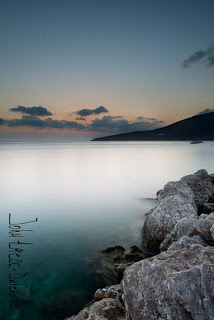
http://john-a-d.wix.com/johnageosphotography

Why a competition? Well. Firstly, to celebrate the fact that FALLING IN HONEY is only 99p on Kindle this summer on Amazon UK sending it soaring up the Kindle charts, and there may still be people out there who haven't read it and would like to. (OK, there may be life on Mars, but still…)
Secondly – this is the exciting part – Summersdale will be publishing my NEW book set on the island in April 2016, and I have to decide on a title. Ideas include:AN OCTOPUS IN MY OUZOLUNCH AT THE BEACHJOINING THE DANCEA TASTE OF WILD BEAUTYOr a translation of an appropriate expression like 'falling in honey' that I haven't yet found... Any of them would be followed by an explanatory subtitle. Feedback and input gratefully received either through comments or the contact form.
Now, back to life in Megalo Horio…

It’s that time of year when it’s so hot, I sleep outside, up on the terrace (on a comfy mattress with pillows of course - I may be weird but I'm not stupid). To block the streetlights down the alley, I’ve created a tent-like construction out of sheets and throws and mosquito net, which is strange but it means I sleep in the cool fresh air under the stars and moon.
I wake up as it gets light, am greeted by a friendly dog, and try to take her for a quick walk before the hot sun comes over the hillside. Then Lisa lies flat out in the shade, paws outstretched, and I work all day (never was the expression 'the sweat of my brow' for a day's work more pertinent) until it cools off enough to walk half an hour to the beach, picking the occasional warm ripe fig along the way. We dive in the sea and come back to work for several hours in the evening again, before collapsing into sleep.
Yesterday afternoon, with no pressing demands, I stayed on Eristos beach for hours, dozing and swimming and reading and throwing the ball for Lisa, until the sun went down behind the mountain. The line of tamarisk trees behind the beach was full of tents, and the edge of the water scattered with naked bodies, with a big stretch of hot sand in between, and the sea calm and clear and pale blue.
In the evening, after I got home – getting a good workout carrying home a three-kilo watermelon, two kilos of tomatoes and a couple of cucumbers – I had a craving for tzatziki. So I showered and dressed and walked down to Kali Kardia, passing Menelaos with his goatherd’s crooked stick coming up the steps (Yeia sou Jenni), and Fotis sitting outside the shop (Yeia sou Jenni), and ran into Astrologos, who is from Athens and one of Eristos’ most famous summer residents. He told me the planets were well aligned right now for Sagittarians, and said it was good to see me back from Australia.
‘Tilos is ena megalo kóllima,’ he said. It’s hard to translate. It’s a stickiness, something gluey - Tilos truly sticks to you, in other words. (New book title: Stuck in the honey… Or a sticky mess, as my friend Anna once put it. My friend Sam suggested something a bit naughtier about someone licking the honey off…)
‘Every summer,’ continued Astrologos, ‘I say I will visit some other islands, Karpathos, Kassos… But if I come to Tilos first, it never happens.’
I needed food. Kali Kardia, apart from fulfilling my tzatziki craving, is also a good place for me to listen to Greek conversation. There’s plenty of banter as guys arrive and leave and sit around telling tales, and I can sit in the corner and pretend to read a book.
A week ago, there’d been a full-on, fist-thumping argument as the men from the village debated who was supposed to be doing what at the upcoming festival. The animals had been slaughtered but who was going to do the butchering? Who was going to do the cleaning up after? It was only a couple of days before the biggest festival of the year, and of course everything was all right on the night. We danced under the trees at the monastery, and ate delicious goat in tomato sauce, and Lisa got some bones to eat the next day. And ever since, I've had the Ayios Panteleimon song looping in my head.
Last night someone was telling fishing stories, and the other guys would occasionally get a word in edgeways, while eating their souvlaki. Eventually I just put my book down, sipped wine and ate salad and listened and smiled.
This morning I have had to brace myself, take a cold shower, and clean the house ready for some guests arriving tomorrow. Lisa, like most dogs, objects on principle to house-cleaning. She spends days giving a house that nice, lived-in feel, spreading her hairs around, carefully arranging her things on the terrace like ornaments - a rope here, a neoprene sock there, leaving the old goat skull just so for that shabby chic look. The appearance even of a broom is enough to send her shuddering outside in disgust usually. But today, she lies in the coolest corner of the house, a serene smile on her face as I sweep the dust and sand around her. That's how hot it is. Maybe I have to give in and get air conditioning next year.
Please don't forget to share this post to have a chance of winning a gorgeous prize of a print like this one. If I get feedback on the new book title, or more people sign up to the blog or my Facebook or Twitter, I'll do another giveaway before long. Efcharisto poli!

http://john-a-d.wix.com/johnageosphotography
Published on August 02, 2015 03:21
July 9, 2015
Eating and Reading: A Literary Feast
I got a nice surprise this morning when, just as I was making bread, an email came through saying a new book with my name on it got reviewed in ‘Waitrose Weekend’. What book is this, you ask? Ta-dah!
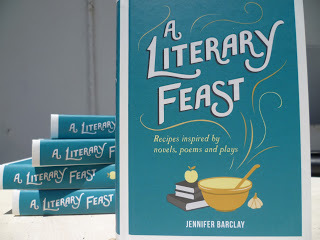 Life is not ALL swimming and ouzo here with me and the blonde beach-hound (no, she is telling me now, we must also play with the rope...). One of the things I do sometimes to scrabble together a living is work as a ‘writer for hire’. Although I never see a royalty after the fee is paid, there’s something satisfying about the work: the publisher has already decided on a good book concept, they give me the brief, and away I go to research and write it. Usually under a pseudonym, I’ve put together gift books like The Walker’s Friend and The Traveller’s Friend and others on such varied topics as retirement, sex (OK, maybe not so varied) and extreme manpower races*
Life is not ALL swimming and ouzo here with me and the blonde beach-hound (no, she is telling me now, we must also play with the rope...). One of the things I do sometimes to scrabble together a living is work as a ‘writer for hire’. Although I never see a royalty after the fee is paid, there’s something satisfying about the work: the publisher has already decided on a good book concept, they give me the brief, and away I go to research and write it. Usually under a pseudonym, I’ve put together gift books like The Walker’s Friend and The Traveller’s Friend and others on such varied topics as retirement, sex (OK, maybe not so varied) and extreme manpower races*
When they asked if I wanted to write A Literary Feast, well – books, food, what’s not to love?! I have to say, I was fascinated by this project. I researched some of the most interesting quotations about food in world literature from across the centuries, and developed them into recipes, interspersing it all with trivia. I was delighted when they wanted to put my real name on the cover.
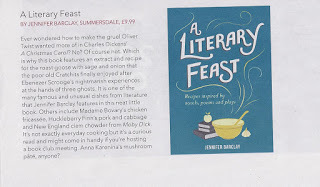 What’s more, there are several pieces for Greece-lovers… There’s a pea soup mentioned in an Aristophanes play, a dolmades recipe (actually a Persian version), quinces and figs, a quotation from Zorba the Greek and Cretan cheese and honey pies inspired by Homer…‘While Odysseus (like James Bond) could easily resist the food and drink that were the downfall of other men, he was helpless when a beautiful woman was on the menu.’
What’s more, there are several pieces for Greece-lovers… There’s a pea soup mentioned in an Aristophanes play, a dolmades recipe (actually a Persian version), quinces and figs, a quotation from Zorba the Greek and Cretan cheese and honey pies inspired by Homer…‘While Odysseus (like James Bond) could easily resist the food and drink that were the downfall of other men, he was helpless when a beautiful woman was on the menu.’
 Some of my other favourite finds were Bridget Jones’s disastrous shepherd’s pie, roast pork sandwiches for Hamlet, a trivia piece on Virginia Woolf’s food references and one on who ate all the pies in literature; too many cooks spoiling the vegetables in Anne of Green Gables and too many ingredients in the Irish stew in Three Men in a Boat… Cornflakes clusters inspired by Harold Pinter’s The Birthday Party, and the surreptitious nibbling of macaroons in Henrik Ibsen.
Some of my other favourite finds were Bridget Jones’s disastrous shepherd’s pie, roast pork sandwiches for Hamlet, a trivia piece on Virginia Woolf’s food references and one on who ate all the pies in literature; too many cooks spoiling the vegetables in Anne of Green Gables and too many ingredients in the Irish stew in Three Men in a Boat… Cornflakes clusters inspired by Harold Pinter’s The Birthday Party, and the surreptitious nibbling of macaroons in Henrik Ibsen.
The Waitrose review said there were many famous and unusual dishes in this 'neat little book', that it was not everyday cooking but a curious read and 'might come in handy if you're hosting a book club meeting'.I hope it’s whetted your appetite and you’ll enjoy grazing through these culinary bon mots…For eating and reading are two pleasures that combine admirably… - C.S. Lewis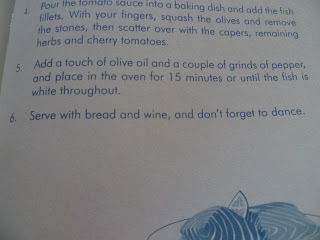
* Also out soon: The World’s Toughest Races!
 Life is not ALL swimming and ouzo here with me and the blonde beach-hound (no, she is telling me now, we must also play with the rope...). One of the things I do sometimes to scrabble together a living is work as a ‘writer for hire’. Although I never see a royalty after the fee is paid, there’s something satisfying about the work: the publisher has already decided on a good book concept, they give me the brief, and away I go to research and write it. Usually under a pseudonym, I’ve put together gift books like The Walker’s Friend and The Traveller’s Friend and others on such varied topics as retirement, sex (OK, maybe not so varied) and extreme manpower races*
Life is not ALL swimming and ouzo here with me and the blonde beach-hound (no, she is telling me now, we must also play with the rope...). One of the things I do sometimes to scrabble together a living is work as a ‘writer for hire’. Although I never see a royalty after the fee is paid, there’s something satisfying about the work: the publisher has already decided on a good book concept, they give me the brief, and away I go to research and write it. Usually under a pseudonym, I’ve put together gift books like The Walker’s Friend and The Traveller’s Friend and others on such varied topics as retirement, sex (OK, maybe not so varied) and extreme manpower races*When they asked if I wanted to write A Literary Feast, well – books, food, what’s not to love?! I have to say, I was fascinated by this project. I researched some of the most interesting quotations about food in world literature from across the centuries, and developed them into recipes, interspersing it all with trivia. I was delighted when they wanted to put my real name on the cover.
 What’s more, there are several pieces for Greece-lovers… There’s a pea soup mentioned in an Aristophanes play, a dolmades recipe (actually a Persian version), quinces and figs, a quotation from Zorba the Greek and Cretan cheese and honey pies inspired by Homer…‘While Odysseus (like James Bond) could easily resist the food and drink that were the downfall of other men, he was helpless when a beautiful woman was on the menu.’
What’s more, there are several pieces for Greece-lovers… There’s a pea soup mentioned in an Aristophanes play, a dolmades recipe (actually a Persian version), quinces and figs, a quotation from Zorba the Greek and Cretan cheese and honey pies inspired by Homer…‘While Odysseus (like James Bond) could easily resist the food and drink that were the downfall of other men, he was helpless when a beautiful woman was on the menu.’
 Some of my other favourite finds were Bridget Jones’s disastrous shepherd’s pie, roast pork sandwiches for Hamlet, a trivia piece on Virginia Woolf’s food references and one on who ate all the pies in literature; too many cooks spoiling the vegetables in Anne of Green Gables and too many ingredients in the Irish stew in Three Men in a Boat… Cornflakes clusters inspired by Harold Pinter’s The Birthday Party, and the surreptitious nibbling of macaroons in Henrik Ibsen.
Some of my other favourite finds were Bridget Jones’s disastrous shepherd’s pie, roast pork sandwiches for Hamlet, a trivia piece on Virginia Woolf’s food references and one on who ate all the pies in literature; too many cooks spoiling the vegetables in Anne of Green Gables and too many ingredients in the Irish stew in Three Men in a Boat… Cornflakes clusters inspired by Harold Pinter’s The Birthday Party, and the surreptitious nibbling of macaroons in Henrik Ibsen.The Waitrose review said there were many famous and unusual dishes in this 'neat little book', that it was not everyday cooking but a curious read and 'might come in handy if you're hosting a book club meeting'.I hope it’s whetted your appetite and you’ll enjoy grazing through these culinary bon mots…For eating and reading are two pleasures that combine admirably… - C.S. Lewis

* Also out soon: The World’s Toughest Races!
Published on July 09, 2015 10:45
Eating and Reading
I got a nice surprise this morning when, just as I was making bread, an email came through saying a new book with my name on it got reviewed in ‘Waitrose Weekend’. What book is this, you ask? Ta-dah!
 Life is not ALL swimming and ouzo here with me and the blonde beach-hound (no, she is telling me now, we must also play with the rope...). One of the things I do sometimes to scrabble together a living is work as a ‘writer for hire’. Although I never see a royalty after the fee is paid, there’s something satisfying about the work: the publisher has already decided on a good book concept, they give me the brief, and away I go to research and write it. Usually under a pseudonym, I’ve put together gift books like The Walker’s Friend and The Traveller’s Friend and others on such varied topics as retirement, sex (OK, maybe not so varied) and extreme manpower races*
Life is not ALL swimming and ouzo here with me and the blonde beach-hound (no, she is telling me now, we must also play with the rope...). One of the things I do sometimes to scrabble together a living is work as a ‘writer for hire’. Although I never see a royalty after the fee is paid, there’s something satisfying about the work: the publisher has already decided on a good book concept, they give me the brief, and away I go to research and write it. Usually under a pseudonym, I’ve put together gift books like The Walker’s Friend and The Traveller’s Friend and others on such varied topics as retirement, sex (OK, maybe not so varied) and extreme manpower races*
When they asked if I wanted to write A Literary Feast, well – books, food, what’s not to love?! I have to say, I was fascinated by this project. I researched some of the most interesting quotations about food in world literature from across the centuries, and developed them into recipes, interspersing it all with trivia. I was delighted when they wanted to put my real name on the cover.What’s more, there are several pieces for Greece-lovers… There’s a pea soup mentioned in an Aristophanes play, a dolmades recipe (actually a Persian version), quinces and figs, a quotation from Zorba the Greek and Cretan cheese and honey pies inspired by Homer…‘While Odysseus (like James Bond) could easily resist the food and drink that were the downfall of other men, he was helpless when a beautiful woman was on the menu.’ Some of my other favourite finds were Bridget Jones’s disastrous shepherd’s pie, roast pork sandwiches for Hamlet, a trivia piece on Virginia Woolf’s food references and one on who ate all the pies in literature; too many cooks spoiling the vegetables in Anne of Green Gables and too many ingredients in the Irish stew in Three Men in a Boat… Cornflakes clusters inspired by Harold Pinter’s The Birthday Party, and the surreptitious nibbling of macaroons in Henrik Ibsen.
Some of my other favourite finds were Bridget Jones’s disastrous shepherd’s pie, roast pork sandwiches for Hamlet, a trivia piece on Virginia Woolf’s food references and one on who ate all the pies in literature; too many cooks spoiling the vegetables in Anne of Green Gables and too many ingredients in the Irish stew in Three Men in a Boat… Cornflakes clusters inspired by Harold Pinter’s The Birthday Party, and the surreptitious nibbling of macaroons in Henrik Ibsen.
The Waitrose review said there were many famous and unusual dishes in this 'neat little book', that it was not everyday cooking but a curious read and 'might come in handy if you're hosting a book club meeting'.I hope it’s whetted your appetite and you’ll enjoy grazing through these culinary bon mots…For eating and reading are two pleasures that combine admirably… - C.S. Lewis
* Also out soon: The World’s Toughest Races!
 Life is not ALL swimming and ouzo here with me and the blonde beach-hound (no, she is telling me now, we must also play with the rope...). One of the things I do sometimes to scrabble together a living is work as a ‘writer for hire’. Although I never see a royalty after the fee is paid, there’s something satisfying about the work: the publisher has already decided on a good book concept, they give me the brief, and away I go to research and write it. Usually under a pseudonym, I’ve put together gift books like The Walker’s Friend and The Traveller’s Friend and others on such varied topics as retirement, sex (OK, maybe not so varied) and extreme manpower races*
Life is not ALL swimming and ouzo here with me and the blonde beach-hound (no, she is telling me now, we must also play with the rope...). One of the things I do sometimes to scrabble together a living is work as a ‘writer for hire’. Although I never see a royalty after the fee is paid, there’s something satisfying about the work: the publisher has already decided on a good book concept, they give me the brief, and away I go to research and write it. Usually under a pseudonym, I’ve put together gift books like The Walker’s Friend and The Traveller’s Friend and others on such varied topics as retirement, sex (OK, maybe not so varied) and extreme manpower races*When they asked if I wanted to write A Literary Feast, well – books, food, what’s not to love?! I have to say, I was fascinated by this project. I researched some of the most interesting quotations about food in world literature from across the centuries, and developed them into recipes, interspersing it all with trivia. I was delighted when they wanted to put my real name on the cover.What’s more, there are several pieces for Greece-lovers… There’s a pea soup mentioned in an Aristophanes play, a dolmades recipe (actually a Persian version), quinces and figs, a quotation from Zorba the Greek and Cretan cheese and honey pies inspired by Homer…‘While Odysseus (like James Bond) could easily resist the food and drink that were the downfall of other men, he was helpless when a beautiful woman was on the menu.’
 Some of my other favourite finds were Bridget Jones’s disastrous shepherd’s pie, roast pork sandwiches for Hamlet, a trivia piece on Virginia Woolf’s food references and one on who ate all the pies in literature; too many cooks spoiling the vegetables in Anne of Green Gables and too many ingredients in the Irish stew in Three Men in a Boat… Cornflakes clusters inspired by Harold Pinter’s The Birthday Party, and the surreptitious nibbling of macaroons in Henrik Ibsen.
Some of my other favourite finds were Bridget Jones’s disastrous shepherd’s pie, roast pork sandwiches for Hamlet, a trivia piece on Virginia Woolf’s food references and one on who ate all the pies in literature; too many cooks spoiling the vegetables in Anne of Green Gables and too many ingredients in the Irish stew in Three Men in a Boat… Cornflakes clusters inspired by Harold Pinter’s The Birthday Party, and the surreptitious nibbling of macaroons in Henrik Ibsen.The Waitrose review said there were many famous and unusual dishes in this 'neat little book', that it was not everyday cooking but a curious read and 'might come in handy if you're hosting a book club meeting'.I hope it’s whetted your appetite and you’ll enjoy grazing through these culinary bon mots…For eating and reading are two pleasures that combine admirably… - C.S. Lewis

* Also out soon: The World’s Toughest Races!
Published on July 09, 2015 10:45
July 5, 2015
The days leading up to the referendum...
 In the days leading up to the referendum, Tilos has been as calm and chaotic as ever. (I've just started re-reading Henry Miller's Colossus of Maroussi, and he says that when he lived in France, he missed the qualities of confusion, chaos and passion - all things he found in Greece. 'The Greeks are an enthusiastic, curious-minded, passionate people,' he wrote in 1941.)There were no queues at our ATM, and no problems taking out money. This is a luxury compared to early last year when we didn’t have a bank for several months; on an island like Tilos with only one ATM and few places that take credit cards, you try to keep cash on you anyway. You don’t worry about money being stolen here. Greek friends might be cautious with money, wondering if they’ll get paid next month. But that didn’t stop people having a party at Kali Kardia in Megalo Horio on the eve of the vote. Early summer is always a time for friends reuniting, seeing people you haven’t seen since last year. Add to that the people who live on Rhodes and elsewhere have come home to vote, and you have a happy occasion, whatever the circumstances. It’s a Greek thing. When Edward and I arranged to meet at Kali Kardia, I’d hoped to overhear some discussion of the situation. I arrived a little early and a dozen people from our village and farms in Eristos valley, along with a few people I didn’t recognise, were sitting around the terrace in a large circle with their coffees or wine and mezzes. There was a good mood, not a hint of fist-banging debate. I guess everyone already knew which way they’d be voting by now.Someone joked, ‘What about the Saint Panteleimon currency?’ referring to the fact that in the nineteenth century the island’s monastery printed banknotes. ‘We should bring that back in!’ This prompted a lively discussion of which Munich museum has samples of the old currency, and how busy the island was back then.As more people arrived – some who live half the year in New York, others who live in Rhodes (and Sotiris had even come all the way from Livadia) – the decibels rose and Michalis and Maria were soon rushing around with plates of food. Nikos and Toula ‘Taxijis’, the former taxi drivers who retired a couple of years ago when the expenses got too high, were at our end of the terrace and cracking lots of jokes. I remembered the Easter Sunday when I drank home-made wine with Nikos, and he kept us draining the glasses and topping them up. Suddenly there were musical instruments, a mandolin and a lyra, in the hands of two skilled musicians, a father and his teenage daughter; she was wearing artfully ripped jeans and smiled sweetly each time she was asked how she tore them. They started playing traditional songs and soon the folks were singing along with gusto, and teasing one another. Pantelis came over to ask at one point how Australia was, and I said the life was boring compared to Greece. He seemed satisfied with that answer. The suburban places I stayed in Australia rarely had inexpensive local places like this where people of all ages gather. And Greeks love to gather. A few older men have taken to simply sitting outside the village shop on chairs, to chat and see people who go by...People by now were buying one another ouzos or little carafes of wine. Nikos was dragging people up to dance. Ela Jennifer, as tin Lisa tora… He made a little dig at me for always being with my dog (she was waiting patiently at home), and told me to get up and dance. I resisted, remembering the time at the koupa where he made me dance to something complicated that I didn’t actually know in front of everyone – very embarrassing. But when I was sure it was an easy one, I got up and joined in. Michalis brought us another little carafe of wine, and said we must stay until the sun comes up. Thankfully we didn’t, but it was after midnight when the party finally broke up.
In the days leading up to the referendum, Tilos has been as calm and chaotic as ever. (I've just started re-reading Henry Miller's Colossus of Maroussi, and he says that when he lived in France, he missed the qualities of confusion, chaos and passion - all things he found in Greece. 'The Greeks are an enthusiastic, curious-minded, passionate people,' he wrote in 1941.)There were no queues at our ATM, and no problems taking out money. This is a luxury compared to early last year when we didn’t have a bank for several months; on an island like Tilos with only one ATM and few places that take credit cards, you try to keep cash on you anyway. You don’t worry about money being stolen here. Greek friends might be cautious with money, wondering if they’ll get paid next month. But that didn’t stop people having a party at Kali Kardia in Megalo Horio on the eve of the vote. Early summer is always a time for friends reuniting, seeing people you haven’t seen since last year. Add to that the people who live on Rhodes and elsewhere have come home to vote, and you have a happy occasion, whatever the circumstances. It’s a Greek thing. When Edward and I arranged to meet at Kali Kardia, I’d hoped to overhear some discussion of the situation. I arrived a little early and a dozen people from our village and farms in Eristos valley, along with a few people I didn’t recognise, were sitting around the terrace in a large circle with their coffees or wine and mezzes. There was a good mood, not a hint of fist-banging debate. I guess everyone already knew which way they’d be voting by now.Someone joked, ‘What about the Saint Panteleimon currency?’ referring to the fact that in the nineteenth century the island’s monastery printed banknotes. ‘We should bring that back in!’ This prompted a lively discussion of which Munich museum has samples of the old currency, and how busy the island was back then.As more people arrived – some who live half the year in New York, others who live in Rhodes (and Sotiris had even come all the way from Livadia) – the decibels rose and Michalis and Maria were soon rushing around with plates of food. Nikos and Toula ‘Taxijis’, the former taxi drivers who retired a couple of years ago when the expenses got too high, were at our end of the terrace and cracking lots of jokes. I remembered the Easter Sunday when I drank home-made wine with Nikos, and he kept us draining the glasses and topping them up. Suddenly there were musical instruments, a mandolin and a lyra, in the hands of two skilled musicians, a father and his teenage daughter; she was wearing artfully ripped jeans and smiled sweetly each time she was asked how she tore them. They started playing traditional songs and soon the folks were singing along with gusto, and teasing one another. Pantelis came over to ask at one point how Australia was, and I said the life was boring compared to Greece. He seemed satisfied with that answer. The suburban places I stayed in Australia rarely had inexpensive local places like this where people of all ages gather. And Greeks love to gather. A few older men have taken to simply sitting outside the village shop on chairs, to chat and see people who go by...People by now were buying one another ouzos or little carafes of wine. Nikos was dragging people up to dance. Ela Jennifer, as tin Lisa tora… He made a little dig at me for always being with my dog (she was waiting patiently at home), and told me to get up and dance. I resisted, remembering the time at the koupa where he made me dance to something complicated that I didn’t actually know in front of everyone – very embarrassing. But when I was sure it was an easy one, I got up and joined in. Michalis brought us another little carafe of wine, and said we must stay until the sun comes up. Thankfully we didn’t, but it was after midnight when the party finally broke up.
 I’d been thinking in the afternoon about village life. Polixeni, in her eighties, often chats to me when I’m taking Lisa for a walk. She’s usually on her way back from taking care of her husband’s grave – she visits him every day down in the cemetery, walks back up the steep hill to her house, catches her breath at the bus stop bench and gets the day’s news by greeting everyone as they pass. She’s basically fit as a fiddle, and her quality of life is as good as it could be. And my day is usually improved when Polixeni taps me playfully with her walking stick. She told me how her father uses to look after his animals. Those were good years then, she said. In case there is still some notion that Tilos is a quiet place where nothing ever happens, it seems that we are back on the main route for people fleeing events in the Middle East. I walked up through the Skafi valley one afternoon this week, collecting bits of rubbish – Turkish kofte wrappers and water bottles – left by a recent arrival of refugees. I’d seen them after they arrived in my village, the police helping them into a truck to take them to the monastery above Livadia, where they could stay until the next boat to Athens. It still feels strange to be in the midst of events that most people only understand vaguely from the news.A friend emailed me from the tiny island of Pserimos saying ten illegal immigrants had arrived and were waiting for a boat, all young, 12-24. They’d paid $2,500 for the very short crossing from Bodrum to Pserimos – people-smugglers are making a fortune out of these people who have left behind good homes to flee the war.Beautiful birds circled above the Skafi valley; if only migrating people were so free. Skafi beach was littered with another batch of brand-new life-jackets, which I gathered up and covered with rocks to stop them blowing into the sea. It was the same as last July, and I amused myself with the thought that unemployed Greeks should go into business selling life-jackets back to Turkey.
I’d been thinking in the afternoon about village life. Polixeni, in her eighties, often chats to me when I’m taking Lisa for a walk. She’s usually on her way back from taking care of her husband’s grave – she visits him every day down in the cemetery, walks back up the steep hill to her house, catches her breath at the bus stop bench and gets the day’s news by greeting everyone as they pass. She’s basically fit as a fiddle, and her quality of life is as good as it could be. And my day is usually improved when Polixeni taps me playfully with her walking stick. She told me how her father uses to look after his animals. Those were good years then, she said. In case there is still some notion that Tilos is a quiet place where nothing ever happens, it seems that we are back on the main route for people fleeing events in the Middle East. I walked up through the Skafi valley one afternoon this week, collecting bits of rubbish – Turkish kofte wrappers and water bottles – left by a recent arrival of refugees. I’d seen them after they arrived in my village, the police helping them into a truck to take them to the monastery above Livadia, where they could stay until the next boat to Athens. It still feels strange to be in the midst of events that most people only understand vaguely from the news.A friend emailed me from the tiny island of Pserimos saying ten illegal immigrants had arrived and were waiting for a boat, all young, 12-24. They’d paid $2,500 for the very short crossing from Bodrum to Pserimos – people-smugglers are making a fortune out of these people who have left behind good homes to flee the war.Beautiful birds circled above the Skafi valley; if only migrating people were so free. Skafi beach was littered with another batch of brand-new life-jackets, which I gathered up and covered with rocks to stop them blowing into the sea. It was the same as last July, and I amused myself with the thought that unemployed Greeks should go into business selling life-jackets back to Turkey.
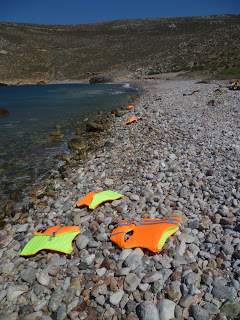 When I went to buy vegetables one morning from the farm at Eristos, an Italian couple were waiting for Michali and we exchanged a few words in a mixture of Greek, English and Italian to pass the time. Michalis – still strong in his eighties from working in his fields – came back with some fresh-cut aubergines for them and they piled tomatoes, peppers, courgettes and watermelon into their car and drove off.‘Can you speak Italian with them?’ I asked. ‘I’m shy to speak it, as I don’t know the grammar, but I understand them when they speak,’ he said. ‘I only did two years of Italian.’I asked if he was at school when the Italians ruled Tilos. Italy took over the Dodecanese from the Turks in 1912. At first they let the islands continue with their own culture, as the Turks had for centuries. But then the Italian regime changed and became more oppressive. From 1938 to 1943, all school lessons were in Italian, and Greek language and history was forbidden.‘I did two years,’ said Michalis, ‘and then I went to Rhodes. There, Greek school was taught in the churches.’‘Secretly?’ I asked.‘Yes, of course, krypha, secretly. But it was proper school! You had to do your homework and pass exams to pass to the next class, and all that. But after that, I couldn’t continue as there was no Greek high school.’When the Germans took the islands over from the Italians, from 1943 to 1945, they allowed Greek schooling again. They had other things to deal with.In the last hundred years, so many of the Dodecanese islands, previously highly populated, flourishing and self-sufficient, had their livelihoods taken away as they passed from one great power to another until they were almost abandoned by the time the Second World War ended. I’d thought about this a lot while in Kastellorizo, which went from 10,000 people to a few hundred. We talked a little about current events and the dimopsifisma, the referendum. ‘If Greece leaves the euro,’ he said, ‘they’ll devalue the currency and you’ll need a big bag of money just to come down here and buy your tomatoes!’ I bought my tomatoes and peppers and zucchini, and Michalis gave me a melon as a gift. It’s a wonderful season for local fruit and vegetables. I’ve been cooking yemista (peppers and tomatoes stuffed with rice, meat and herbs) and melitzanes tiganites (slices of aubergine, salted to take out the bitterness, then dipped in flour and fried in oil). I also made karidopita, walnut cake soaked in honey syrup – made with local honey.
When I went to buy vegetables one morning from the farm at Eristos, an Italian couple were waiting for Michali and we exchanged a few words in a mixture of Greek, English and Italian to pass the time. Michalis – still strong in his eighties from working in his fields – came back with some fresh-cut aubergines for them and they piled tomatoes, peppers, courgettes and watermelon into their car and drove off.‘Can you speak Italian with them?’ I asked. ‘I’m shy to speak it, as I don’t know the grammar, but I understand them when they speak,’ he said. ‘I only did two years of Italian.’I asked if he was at school when the Italians ruled Tilos. Italy took over the Dodecanese from the Turks in 1912. At first they let the islands continue with their own culture, as the Turks had for centuries. But then the Italian regime changed and became more oppressive. From 1938 to 1943, all school lessons were in Italian, and Greek language and history was forbidden.‘I did two years,’ said Michalis, ‘and then I went to Rhodes. There, Greek school was taught in the churches.’‘Secretly?’ I asked.‘Yes, of course, krypha, secretly. But it was proper school! You had to do your homework and pass exams to pass to the next class, and all that. But after that, I couldn’t continue as there was no Greek high school.’When the Germans took the islands over from the Italians, from 1943 to 1945, they allowed Greek schooling again. They had other things to deal with.In the last hundred years, so many of the Dodecanese islands, previously highly populated, flourishing and self-sufficient, had their livelihoods taken away as they passed from one great power to another until they were almost abandoned by the time the Second World War ended. I’d thought about this a lot while in Kastellorizo, which went from 10,000 people to a few hundred. We talked a little about current events and the dimopsifisma, the referendum. ‘If Greece leaves the euro,’ he said, ‘they’ll devalue the currency and you’ll need a big bag of money just to come down here and buy your tomatoes!’ I bought my tomatoes and peppers and zucchini, and Michalis gave me a melon as a gift. It’s a wonderful season for local fruit and vegetables. I’ve been cooking yemista (peppers and tomatoes stuffed with rice, meat and herbs) and melitzanes tiganites (slices of aubergine, salted to take out the bitterness, then dipped in flour and fried in oil). I also made karidopita, walnut cake soaked in honey syrup – made with local honey. In the evening, I sit on the terrace in one of the comfortable old chairs I inherited from a friend who moved, with Lisa chewing a bone close by. My wine and olives on an improvised table made from a plank of wood and some bricks, I look out at the rugged hills and bright moon, hoping things won’t change too much.*** If you're interested in pet-sitting Lisa when I have to go away in mid-August, mid-October, or over Christmas, please contact me through the contact form, Facebook or Twitter for more information. She's a lovely, affectionate dog and the house is in the heart of lovely Megalo Horio. Thanks!
Published on July 05, 2015 03:49



